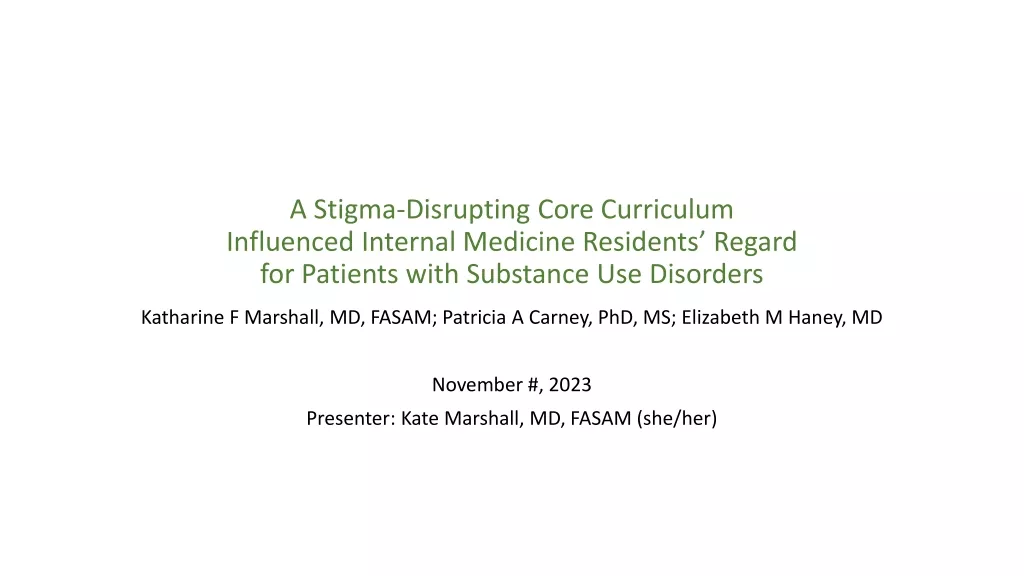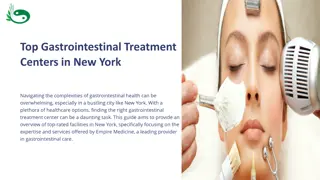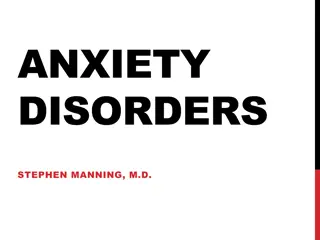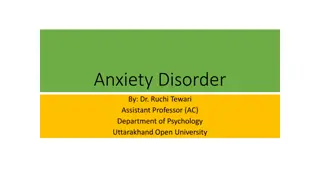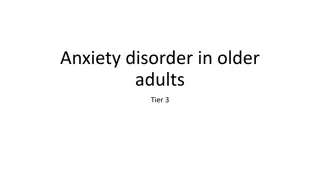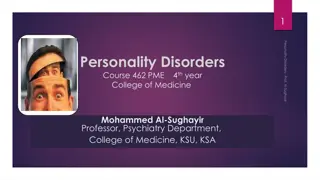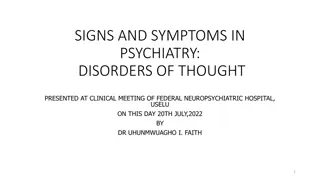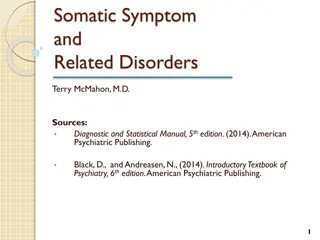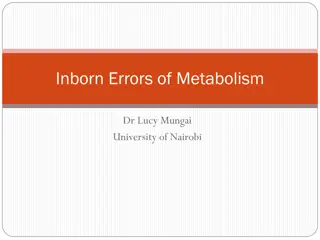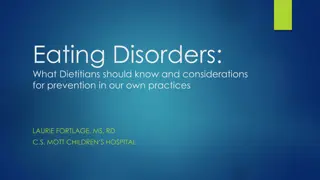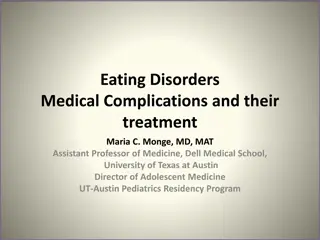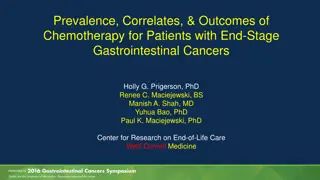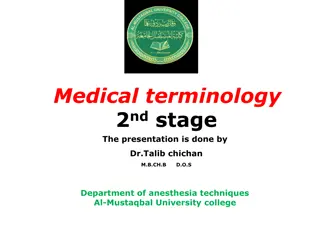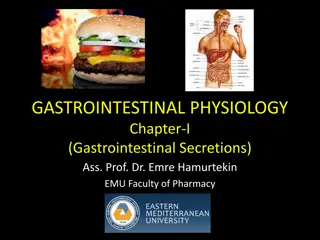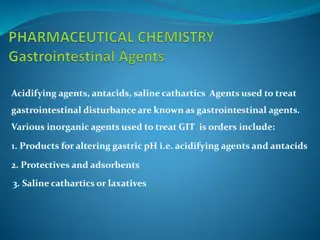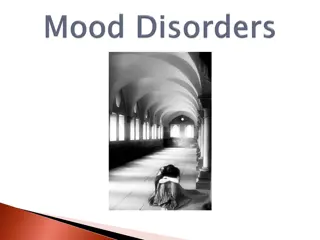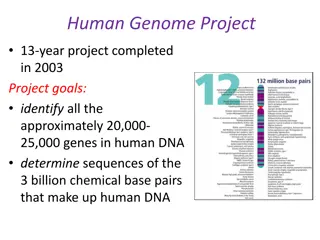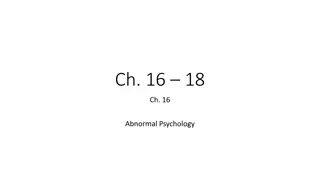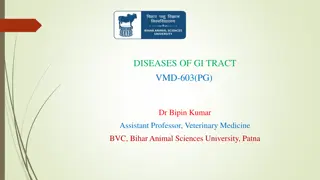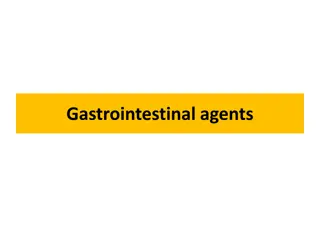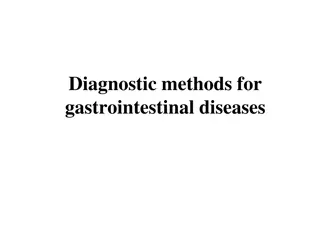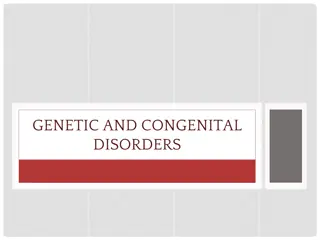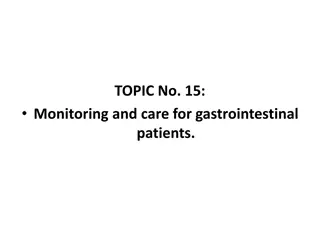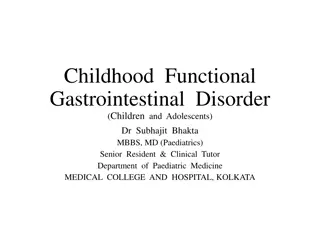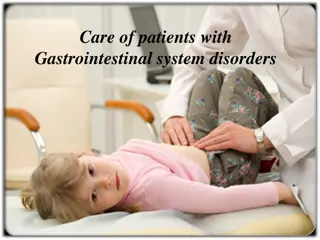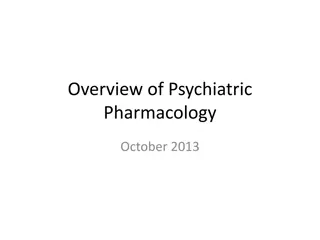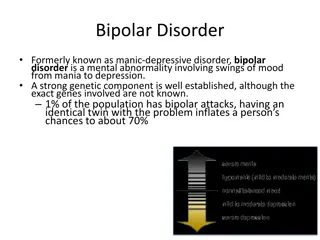Gynecological disorders
Common gynecological disorders including menstrual disorders and abnormal uterine bleeding. Find out about the nursing role in diagnosing and treating these disorders.
3 views • 22 slides
Enhancing Internal Medicine Residents' Approach to Patients with Substance Use Disorders
This study focuses on developing and implementing a stigma-disrupting curriculum to improve internal medicine residents' attitudes and knowledge regarding patients with substance use disorders. By addressing provider stigma and enhancing preparedness, the aim is to promote positive regard and increa
1 views • 27 slides
Exploring Mental Health Categories and Disorders
In today's categories, we delve into themes like stigma, recovery, myths, and facts surrounding mental health. We discuss various disorders including psychotic disorders and observable signs like hallucinations, delusions, and flat affect. Discover the signs and symptoms of mood disorders and high/l
1 views • 71 slides
Top-Gastrointestinal-Treatment-Centers-in-New-York
Navigating the complexities of gastrointestinal health can be overwhelming, especially in a bustling city like New York. With a plethora of healthcare options, finding the right gastrointestinal treatment center can be a daunting task. This guide aims to provide an overview of top-rated facilities i
0 views • 6 slides
Overview of Human Genetic Disorders
Human genetic disorders encompass a range of conditions, from recessive disorders like cystic fibrosis to dominant disorders such as Huntington's disease. Examples include cystic fibrosis, Huntington's disease, and sickle-cell anemia. Understanding genetic disorders involves research and awareness o
0 views • 10 slides
Understanding Anxiety Disorders in DSM-5
Anxiety disorders encompass a range of conditions, from separation anxiety to social phobia and generalized anxiety disorder. The DSM-5 has re-conceptualized these disorders, grouping OCD in its own category and moving PTSD to trauma-related disorders. Recognizing symptoms and seeking appropriate tr
1 views • 96 slides
Understanding Anxiety Disorders and Related Conditions
Explore the distinguishing features of anxiety disorders such as generalized anxiety disorder, panic disorder, and phobias, along with insights into obsessive-compulsive disorder (OCD) and posttraumatic stress disorder (PTSD). Delve into the impact of conditioning, cognition, and biology on these co
2 views • 46 slides
Overview of Anxiety and Related Disorders
Anxiety disorders, such as PTSD, panic disorders, phobias, agoraphobia, and OCD, are characterized by varying degrees of fear and distress. Anxiety is a normal response to danger, but when it becomes chronic, it can lead to debilitating conditions. PTSD occurs post-trauma, panic disorders involve in
1 views • 42 slides
Understanding Anxiety Disorders: Causes, Symptoms, and Types
Anxiety disorders are a group of mental illnesses characterized by excessive and overwhelming anxiety and fear. This article explains the normal emotion of anxiety, symptoms of anxiety disorders, types of anxiety disorders, and common causes like genetics, brain chemistry, environmental stress, and
1 views • 8 slides
Understanding Anxiety Disorders in Older Adults
Anxiety disorders in older adults are prevalent but often unrecognized. These disorders can manifest alongside depression, impacting daily life. Risk factors include gender, education, health status, traumatic events, and more. Types of anxiety disorders include generalized anxiety, phobias, panic d
0 views • 17 slides
Understanding Personality Disorders: A Comprehensive Overview and Classification
Dive into the world of personality disorders with this informative presentation by Professor Al-Sughayir. Explore the definition of personality, various types of disorders, traits, terminologies, and etiology. Gain insights into normal versus abnormal traits, functional impairments, and the role of
1 views • 25 slides
Understanding Somatic Symptom Disorders, Conversion Disorders, and Dissociative Disorders
Somatic symptom disorders manifest as physical symptoms without apparent cause, while conversion disorders involve specific physical symptoms incompatible with medical conditions. Illness anxiety disorder involves interpreting normal sensations as disease symptoms. Dissociative disorders lead to a s
1 views • 41 slides
Understanding Thought Disorders in Psychiatry: Insights from Clinical Meeting Presentation
Explore the definitions and divisions of thought disturbances in psychiatry, including disorders of thought stream, form, content, and possession. Delve into thought stream disorders like tempo and continuity disruptions, as well as form of thinking disorders seen in conditions like schizophrenia. G
1 views • 32 slides
Understanding Somatic Symptom and Related Disorders
Exploring the key features, diagnostic criteria, contributing factors, and management principles of Somatic Symptom and Related Disorders. This comprehensive guide covers the clinical manifestations, co-morbidities, and treatment approaches associated with these disorders, shedding light on somatic
2 views • 38 slides
Understanding Inborn Errors of Metabolism and Metabolic Disorders
Inborn Errors of Metabolism (IEM) are genetic disorders that disrupt metabolic pathways, leading to substrate accumulation or product deficiency. These disorders can be classified based on toxic accumulation, protein metabolism, carbohydrate intolerance, lysosomal storage issues, energy production d
0 views • 29 slides
Understanding Co-occurring Mental and Physical Health Conditions
Co-occurring mental and physical health disorders are prevalent and require an integrative multidisciplinary approach for effective assessment and treatment. This holistic approach helps address the complexity of managing multiple disorders in an integrated healthcare setting. Through a multi-direct
1 views • 37 slides
Understanding Functional GI Disorders: A Comprehensive Overview
Functional GI disorders encompass a range of conditions affecting the gastrointestinal system, such as irritable bowel syndrome and disorders of the gut-brain interaction. These disorders are characterized by no structural abnormalities but are influenced by factors like motility disturbance, viscer
0 views • 42 slides
Understanding Genetic Disorders and Their Impact on Health
Genetic disorders are caused by abnormalities in genes or chromosomes, leading to various health conditions. Inherited disorders can be passed down from parents to children, affecting physical makeup and processes in the body. In India, there is a high prevalence of genetic disorders, particularly i
1 views • 12 slides
Understanding Eating Disorders: Types, Signs, Effects, and Recovery
Eating disorders are mental disorders characterized by unhealthy eating habits and can have severe physical and psychological consequences. This article explores the definition of eating disorders, signs to look out for, different types such as Anorexia Nervosa, Bulimia Nervosa, Pica, and Purging Di
0 views • 10 slides
Understanding Eating Disorders: Insights for Dietitians
Eating disorders are complex neurobiological conditions that are not merely about control or weight management. These disorders can affect individuals of all genders, body sizes, and socioeconomic backgrounds. Dietitians play a crucial role in identifying, assessing, and treating eating disorders, a
0 views • 41 slides
Understanding Eating Disorders: Medical Complications and Treatment
This presentation by Dr. Maria C. Monge covers the common eating disorders in teenage patients, potential medical complications, and the role of the medical team in treatment. It includes definitions of disorders like Anorexia Nervosa, Bulimia Nervosa, and Binge Eating Disorder according to DSM-5 cr
0 views • 60 slides
Understanding Neurodevelopmental Disorders in Childhood and Adolescence
Neurodevelopmental disorders in childhood and adolescence encompass a range of conditions including intellectual disabilities, communication disorders, autism spectrum disorder, and attention deficit/hyperactivity disorder. These disorders impact cognitive development, adaptive functioning, and comm
0 views • 30 slides
Understanding Sleep Disorders: Classification and Diagnosis
Sleep disorders encompass various conditions affecting sleep patterns and quality. They are classified into categories such as insomnia, sleep-related breathing disorders, central disorders of hypersomnolence, circadian rhythm sleep-wake disorders, parasomnias, and sleep-related movement disorders.
0 views • 32 slides
Chemotherapy Utilization in End-Stage Gastrointestinal Cancer Patients
This presentation explores the prevalence, correlates, and outcomes of chemotherapy use in patients with end-stage gastrointestinal cancers. Data is presented on the frequency of chemotherapy administration, correlates, harms, and benefits in patients in their final months of life. Insights from stu
0 views • 21 slides
Comprehensive Overview of Medical Terminology in Gastrointestinal System
This content provides a detailed exploration of medical terminology related to the gastrointestinal system. It covers definitions, word roots, combining vowels, suffixes, and prefixes commonly used in this medical field. The material includes information on anatomical terms such as anus, appendix, c
0 views • 18 slides
Overview of Gastrointestinal Secretions and Structural Considerations
In this informative presentation by Assistant Professor Dr. Emre Hamurtekin, the focus is on gastrointestinal secretions including salivary, gastric, pancreatic, biliary, and intestinal fluids. Structural considerations such as the surface area for absorption, sphincters, villi, and crypts are discu
0 views • 33 slides
Understanding Gastrointestinal Agents: Acidifying Agents, Antacids, Saline Cathartics
Gastrointestinal agents such as acidifying agents, antacids, and saline cathartics are used to manage gastrointestinal disturbances. Acidifying agents like Hydrochloric Acid aid in gastric digestion, while antacids help reduce gastric acidity. Saline cathartics are used as laxatives. Achlorhydria, a
0 views • 36 slides
Understanding Grief and Depressive Disorders: A Comparative Analysis
Grief and depressive disorders share similarities but also have distinct differences. Grief is a universal emotional state following loss, while depressive disorders involve prolonged mood disturbances. The stages of grief include denial, anger, bargaining, depression, and acceptance, with intervent
0 views • 79 slides
Understanding Genetic Disorders and the Human Genome Project
The Human Genome Project, completed in 2003, aimed to identify all human genes and DNA sequences. Genetic disorders, like autosomal disorders and Huntington's disease, can result from mutations at different levels, affecting single genes, chromosomes, or multiple genes. Albinism and cystic fibrosis
0 views • 37 slides
Understanding Abnormal Psychology: Disorders, Symptoms, and Treatments
Explore the world of abnormal psychology through the lens of different disorders like depression, anxiety, and phobias. Learn about the definitions of abnormal behavior, DSM-V classifications, and various types of psychological disorders. Delve into the complexities of mental health conditions such
0 views • 39 slides
Equine Gastrointestinal Tract Disorders and Dysphagia Overview
This informative content covers various diseases of the gastrointestinal tract in horses, including oral cavity conditions, dysphagia, sialadenitis, and esophageal disorders like choke. It discusses anatomical classifications, causes, clinical manifestations, and treatment approaches for these condi
0 views • 19 slides
Understanding Gastrointestinal Agents and Disorders
Learn about gastrointestinal agents used in the treatment of GIT disorders such as achlorhydria, hyperacidity, diarrhea, and constipation. Explore the classification of gastrointestinal agents including gastric acidifiers, antacids, protectives, adsorbents, and cathartics. Discover the causes and sy
0 views • 45 slides
Overview of Classification of Psychiatric Disorders
Psychiatric disorders are illnesses with various manifestations that impact functioning due to disturbances in biological, social, genetic, and other factors. Two key classification systems, ICD-10 and DSM-5, categorize over 200 types of psychiatric illnesses. The ICD-10 includes categories like org
0 views • 18 slides
Diagnostic Methods for Gastrointestinal Diseases: A Comprehensive Overview
Explore various diagnostic methods for gastrointestinal diseases, including laboratory investigations, abdominal ultrasound features, and radiology techniques. Learn about the significance of different tests such as ESR, blood count, liver tests, and abdominal ultrasound in diagnosing conditions aff
0 views • 40 slides
Overview of Genetic and Congenital Disorders and Their Causes
Explore the terminology, causes, characteristics, and results of genetic and congenital disorders, as well as the disorders of single-gene inheritance. Learn about autosomal dominant disorders like Marfan Syndrome and Neurofibromatosis. Discover how single-gene disorders are inherited and their impa
0 views • 24 slides
Essential Monitoring and Care for Gastrointestinal Patients
Learn about monitoring and caring for gastrointestinal patients, including identifying key symptoms like appetite changes, taste alterations, swallowing difficulties, gastric dyspepsia, and more. Discover how to provide proper nursing care, address acute abdominal pain and gastrointestinal bleeding,
0 views • 28 slides
Understanding Childhood Functional Gastrointestinal Disorders
Functional Gastrointestinal Disorders (FGIDs) in children and adolescents are characterized by chronic or recurring symptoms that cannot be fully explained by current structural or biochemical tests. These disorders emphasize the role of normal development in symptom presentation and the lack of evi
0 views • 46 slides
Understanding Gastrointestinal System Disorders and Endoscopy Procedures
Gastrointestinal (GI) tract disorders are common and can affect various parts of the digestive system. The GI system plays a vital role in ingestion, nutrient absorption, and waste elimination. Endoscopy is a non-surgical procedure used to diagnose and treat GI issues by visualizing the digestive tr
0 views • 42 slides
Overview of Psychiatric Pharmacology: A Comprehensive Guide from 2013
This presentation delves into the nuances of psychiatric pharmacology, exploring common psychiatric conditions, historical perspectives on medical treatments, categories of psychiatric medications, and principles of treatment. It also touches on mental illness definitions from DSM-IV-TR and DSM-V, a
0 views • 27 slides
Understanding Mental Health Disorders: Bipolar Disorder, Anxiety Disorders, & More
Exploring various mental health disorders such as Bipolar Disorder, Anxiety Disorders, Generalized Anxiety Disorder, Panic Disorder, and Phobic Disorders. Learn about their symptoms, prevalence, and impacts on individuals' lives.
0 views • 41 slides

